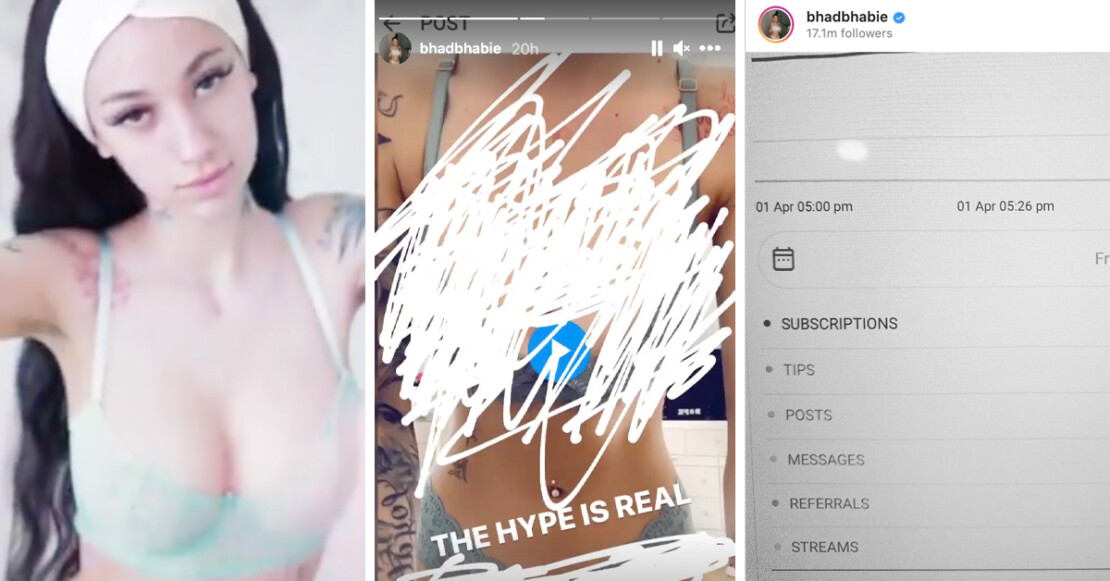Bhad Bhabie OnlyFans: Exploring Content Leaks & Privacy Concerns - Discover
Could the digital age's insatiable appetite for content be eroding the very foundations of privacy and artistic ownership? The recent incidents surrounding online content leaks, particularly those impacting figures like Bhad Bhabie, have illuminated a complex web of legal, ethical, and societal concerns that demand our immediate attention.
The phrase "We did not find results for: Bhad bhabie onlyfans leaks nudes see whats trending now" serves as a stark reminder of the internet's relentless pursuit of the sensational. Its a digital echo of the relentless demand for the intimate, the forbidden, and the readily accessible, however, it also underlines the inadequacy of search algorithms to discern between legitimate content and exploitative searches. These searches, and the resulting conversations, cast a long shadow, painting a picture of an industry operating in the gray areas of legality and public perception.
The recurring "Check spelling or type a new query" response offers a veneer of technicality, masking a deeper issue: the deliberate evasion of content moderation and the perpetuation of harmful search terms. The very fact that such searches are attempted, and the persistence of related conversations, speaks to a problem far larger than grammatical errors. It points toward a culture desensitized to the violation of privacy and the potential for exploitation. This pattern continues, highlighting the need for robust tools to identify, flag, and remove content associated with non-consensual intimate media.
- Explore Aagmaltv Your Ultimate Digital Entertainment Hub
- Find Somali Wasmo Channels Groups On Telegram Now
The case of Bhad Bhabie, who has navigated the minefield of internet fame as a meme, rapper, and OnlyFans star, provides a compelling case study. The evolution of her public persona, from viral sensation to a purveyor of adult content, showcases the rapid and often unpredictable trajectories that digital celebrities traverse. The shift from being a meme to an OnlyFans star, and finally the desire to simply "chill," underscores the constant pressure to perform, to adapt, and to remain relevant in a volatile landscape. This transformation, however, is often at odds with the fundamental right to privacy and personal autonomy.
Content leaks, in all their forms, represent a significant breach of privacy. This extends beyond the obvious violation of an individual's personal space, it also impacts the livelihoods of creators and the integrity of online platforms. The ethical implications are far-reaching, touching on issues of consent, exploitation, and the potential for irreversible harm to individuals. The anonymity afforded by the internet can embolden those who engage in malicious activities, making it difficult to hold perpetrators accountable and further complicating the fight against content leaks.
The legal landscape surrounding content leaks is complex and varies depending on jurisdiction. Intellectual property laws are at the core of many such cases, but privacy rights and the regulations surrounding online platforms also play a crucial role. The challenge for legal systems lies in keeping pace with technological advancements and the ingenuity of those who seek to exploit them. Establishing clear definitions of "consent," "harm," and "intellectual property" is crucial to create a legal framework that protects both creators and consumers. International cooperation is also essential, given the global nature of the internet and the widespread reach of content leaks.
The questions of online platform security are central to the problem. Are platforms adequately equipped to prevent the unauthorized distribution of content? Do they have the proper procedures in place to swiftly address reports of leaks and take action against those responsible? Furthermore, are they doing enough to protect the privacy of users and creators on their platforms? The answers to these questions have implications for the trustworthiness of these platforms, the economic viability of creators, and the overall health of the online environment.
The rights of creators to protect their intellectual property are paramount in the digital age. This protection is not merely about economic considerations; it is about empowering creators to control their narratives, manage their reputations, and profit from their work. Effective copyright laws, coupled with vigilant platform moderation, are critical to ensuring that creators can share their work and earn a living without fear of exploitation.
The current situation demands a multi-pronged approach. Enhanced platform security, more robust legal frameworks, and a greater emphasis on media literacy are all necessary. We need to foster a culture that values privacy, respects intellectual property, and holds individuals accountable for their online actions. It is only through such collaborative efforts that we can begin to mitigate the damage caused by content leaks and create a healthier online environment.
| Category | Details |
|---|---|
| Full Name | Danielle Bregoli |
| Date of Birth | March 26, 2003 |
| Place of Birth | Boynton Beach, Florida, USA |
| Nationality | American |
| Known For | Becoming a viral sensation as a teenager and also known for her music career as a rapper |
| Career | Rapper, television personality, internet personality, and OnlyFans creator |
| Musical Genres | Hip hop, trap |
| Notable Songs | "These Heaux," "Gucci Flip Flops," "Bestie," "Hi Bich" |
| Social Media Presence | Active on platforms like Instagram, Twitter, and YouTube |
| OnlyFans | Significant presence as a content creator |
| Net Worth | Estimated to be around $20 million |
| Controversies | Various incidents that have been a topic of discussion in the public eye, including feuds and legal issues |
| Personal Life | Information on her personal life is a matter of public record, especially regarding her upbringing. |
| Link to Reference Website | IMDb (for basic biographical information) |
In the broader context of content leaks, the issues are not limited to any single creator or platform. The underlying problems persist across the digital sphere, reflecting the tension between technological advancement and human rights. The challenges are profound and require a collaborative effort to find effective solutions.
One of the most critical aspects of addressing the issue of content leaks is improving platform security and content moderation. Online platforms, including social media sites, content sharing services, and adult entertainment websites, have a responsibility to create a secure environment for their users. This includes implementing robust security measures to prevent unauthorized access to accounts and data, using sophisticated algorithms to detect and remove leaked content quickly, and establishing clear reporting procedures to address violations of their terms of service.
The legal frameworks governing content leaks must be updated to keep pace with rapidly evolving technology. Current laws are often inadequate to address the complexities of the digital age. Legislators need to work with technology experts, legal scholars, and industry stakeholders to create comprehensive legislation that clearly defines intellectual property rights, privacy rights, and the responsibilities of online platforms. International cooperation is also essential to address the cross-border nature of content leaks and hold perpetrators accountable regardless of their location.
A crucial element in combating content leaks is to promote media literacy. Raising public awareness of the risks associated with online content, including the potential for exploitation, privacy breaches, and the sharing of non-consensual intimate media, is essential. Media literacy education should begin early and extend across all age groups. It should empower individuals to critically evaluate online content, understand their privacy settings, and report instances of leaked content to the appropriate authorities.
The phenomenon of "revenge porn," where intimate images or videos are shared without consent, requires a specific focus. This form of online harassment can have devastating psychological and social consequences for victims. Laws against revenge porn should be strengthened, and platforms should be required to take immediate action to remove such content and protect the privacy of victims. Resources for victims, including legal assistance, mental health support, and counseling, should be readily available.
Content creators have a significant role to play in protecting their intellectual property. They should employ security measures to protect their content, such as watermarks, encryption, and access controls. They should also be aware of their legal rights and take action against those who violate their copyrights or privacy. Collaborating with legal professionals and industry organizations can help creators navigate the complex legal landscape and protect their work.
The rise of artificial intelligence (AI) presents new challenges and opportunities in the fight against content leaks. AI can be used to identify and remove leaked content, detect deepfakes, and analyze online behavior to identify potential threats. However, AI also raises ethical concerns, including bias, transparency, and the potential for misuse. It is crucial to develop and implement AI-based solutions responsibly, ensuring that they are aligned with ethical principles and human rights.
The issue of online content leaks has far-reaching implications for individual well-being, artistic integrity, and the overall health of the digital ecosystem. It is a multi-faceted problem that requires a comprehensive and collaborative approach. By improving platform security, updating legal frameworks, promoting media literacy, supporting victims, and leveraging technological advancements responsibly, we can create a safer, more ethical, and more equitable online environment. This work requires consistent effort and willingness to adapt as technology evolves. The goal is to prevent the exploitation of individuals, safeguard the rights of content creators, and build a digital world that is both innovative and responsible.
The case of Bhad Bhabie represents a microcosm of these larger societal issues. The legal and ethical concerns surrounding her content underscore the urgency of addressing these problems. The shift in her public persona and the desire to seek a more private life underscores the personal tolls of navigating the often-unforgiving online realm. Her story serves as a reminder that behind every viral sensation, every OnlyFans star, and every online persona, there is a human being with the right to privacy, autonomy, and the freedom to chart their own course.
The repeated "We did not find results for:" prompt, followed by a request to "Check spelling or type a new query," reinforces the necessity of digital hygiene. It underscores the potential for misinformation, the power of search engines to shape online narratives, and the importance of critically evaluating information. Digital consumers must become discerning, capable of distinguishing between accurate information and malicious attempts to exploit, mislead, or violate an individual's privacy. As the online landscape grows more complex, the ability to identify and resist the manipulation of digital spaces will be essential. This demands media literacy, critical thinking, and a collective commitment to holding platforms and individuals accountable.
The discussion regarding leaked content, like in the case of Bhad Bhabie, is a call for a culture of respect, empathy, and responsibility. The digital sphere should reflect the values of our society, including the protection of individual rights and the recognition of the value of artistic work. By fostering a greater sense of community and accountability, it is possible to create an online environment that is both safe and enriching for all.
In the final analysis, addressing content leaks is not merely a technological or legal issue. It is a human issue that demands a collaborative approach. This includes a commitment from technology companies, lawmakers, educators, and the public. By working together, we can make significant strides in creating a safer, more ethical, and more sustainable online environment. It is an ongoing process that requires constant vigilance, continuous adaptation, and a steadfast dedication to upholding the rights and dignity of every individual. As the digital world evolves, so too must our commitment to protecting privacy and preventing content leaks. The future of the internet will depend on it.
- Maddipann Onlyfans Exclusive Nude Content Videos
- Bollyflix Is It Safe Legal Your Guide To Bollywood Streaming

Bhad Bhabie Breaks OnlyFans Record Raking In 1 Million In 6 Hours

bhad bhabie onlyfans leaked 2023 ImageGallery

See Bhad Bhabie Like Never Before OnlyFans Sneak Peek TAMU